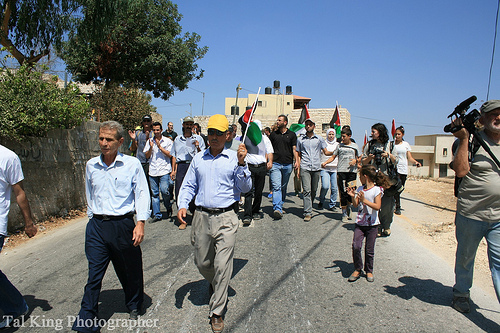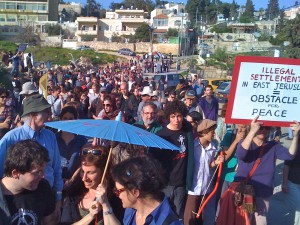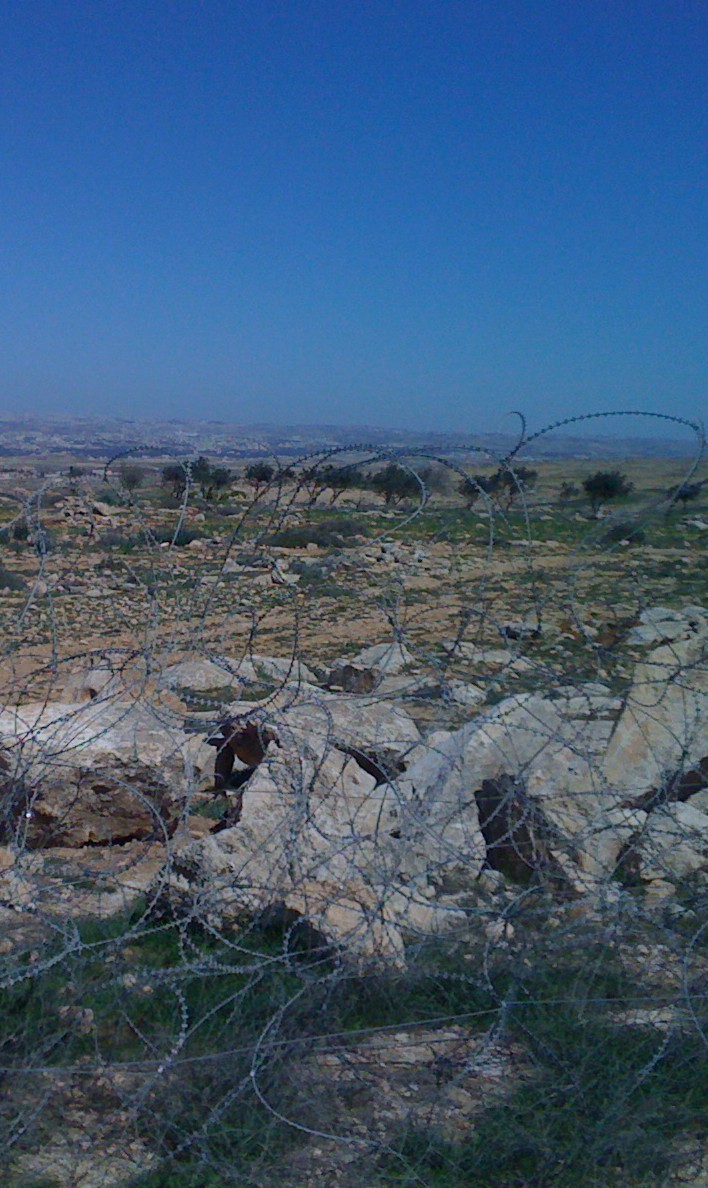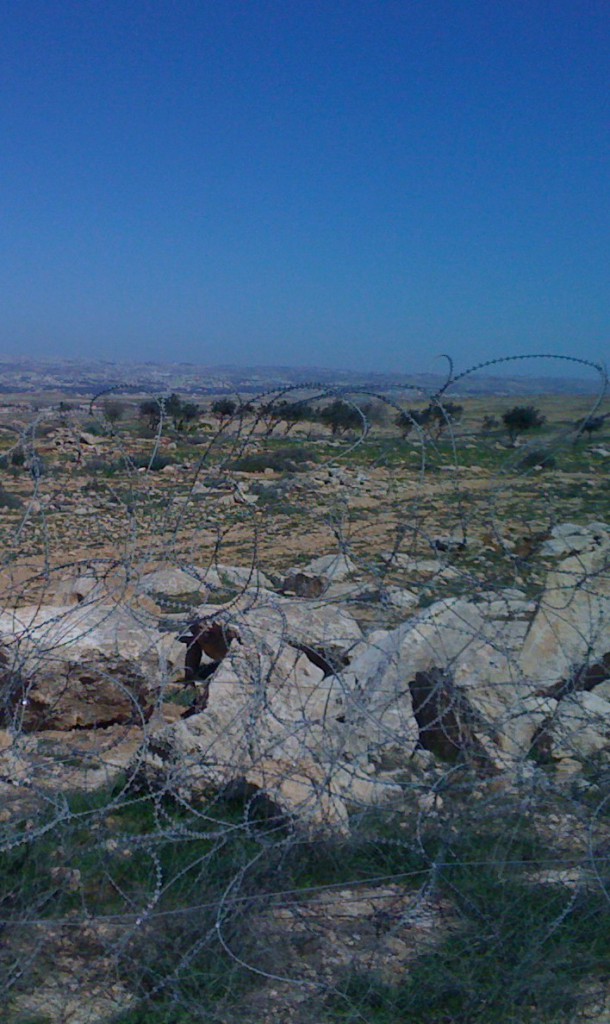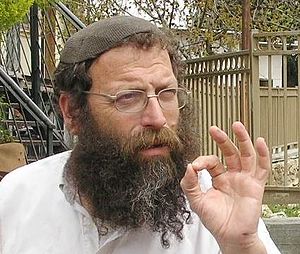(June 10, 2011)
Today I had a small taste of confronting the Israeli occupation from the Palestinian side, and I confess that even my brief exposure was traumatic.
Heeding the invitation of my friend Gershon Baskin for Israelis to join him at the weekly non-violent protest in the West Bank village of Nabi Saleh, in the hope of mitigating the brutal force the Israeli army exerts against the protesters, I set out early Friday morning with most of the things on the list Gershon sent me – food, water, sunscreen, a towel against tear gas – in my backpack, and a sense of foreboding in my heart.
When I said I was afraid of being hurt, Gershon replied “you’re right. It can be dangerous.” He had no words of comfort, except for repeating that he was going to call the army command before the demonstration started and tell them that dozens of Israeli supporters were going to march with the Palestinians, and ask them to take that into consideration.
As planned, we arrived at 8 a.m. for the 1 p.m. event, hoping to get into the village before the army sealed it off. But it was too late: soldiers blocked the entrance and waved us off. They had also put up a sign declaring the village “Area A” – under control of the Palestinian Authority under the Oslo Accords, which Israeli law forbids Israelis to enter. The village is really Area C, which Israelis are allowed into. The sign was a lie. We parked a ways up the road and then the dozen or so activists who had arrived hiked into the village through the fields for twenty minutes. On the way, Gershon advised us to speak quietly and silence our phones. The village had been declared a “closed military area,” and we were violating the law.
We soon found out that two activists who tried to enter the main way were arrested and charged with “attempting to break through an army barricade.”
After gathering in the village square, we were invited to the home of one of the village leaders, a friend of Gershon’s, with whom he had coordinated our solidarity visit. Over coffee in his spacious salon our host briefed us about the village’s struggle to reclaim its land on which the settlement of Halamish was built. He said the Israeli High Court ruled in their favor but they never got their land back or were allowed access to their fields abetting it. Settlers took over Nabi Saleh’s spring and for the past two years the villagers had tried to march to it every Friday but had been held back by the army.
Gershon told us that at first a lot of Israelis had signed up for this action, but as the week went on they started cancelling out of fear. He said he didn’t blame them. I didn’t either: after being the first one to sign up, as Gershon told me, out of a sense of outrage at the army’s brutality and my wish to join the campaign to challenge it, my fear took over. As the day neared I slept worse every night, and the last night I hardly slept at all.
While we waited for the march, there was less talk of principles of non-violent resistance than of practicalities: what to do against tear gas and how to behave if arrested. My friends and I agreed we were here to make a point by our presence but our cowardice would keep us at the back of the crowd where we would be less exposed. I kept thinking of my family worrying about me at home and couldn’t wait for it to be over, even before it started. An Israeli journalist who was with us felt that we were insufficiently welcomed by the villagers, that they could have been more appreciative of the effort and gesture we made in coming out. An activist answered her that it wasn’t for us to tell the Palestinians how to behave. I admit I had also expected a little more visible appreciation for what in my society is an extraordinary show of solidarity with those most Israelis see as enemies. But when I considered how badly they had been treated by Israelis for so long – and where were we then? – I understood their complex feelings. Besides, they did welcome us into their homes and tell us they would do everything they could to protect us.
In one of the homes we visited, our host told us his 19-year-old daughter had been beaten up by Israeli border police last month and put in the hospital. In an unusual turn of events, the police were put on trial and she was summoned to testify against them. When the same young woman admired my new wide-brimmed straw hat, I gave it to her in exchange for her showing me how to wrap my scarf around my head Palestinian-style. An activist offered me jasmine perfume to spray on the front of my scarf as an antidote to the anticipated tear gas. Another advised us to buddy up and a third said the most important thing about tear gas was not to panic.
As the event drew near, Gershon made his phone calls to the army but was not successful: at the two offices he reached – the local and regional commands – he was unable to speak to the officers in charge and left messages with unreliable-sounding young soldiers. It looked like the central plank of his initiative – informing the army of our presence and asking them to be gentle – was falling apart.
At 1:15 people started streaming out of the mosque and amassed for the march. A young man with a megaphone said a few words and I translated for my fellow activists: “Today we are marching for the martyrs who died on Israel’s borders with Syria,” referring to a protest earlier in the week. We looked at each other in confusion. Weren’t we marching for an end to the occupation and allowing the villagers to access their spring?
We didn’t have long to ponder this because within 100 meters and 60 seconds the first tear gas canister was fired from far off at the entrance of the village into its center. Immediately everyone started running back, away from the soldiers, but, as it happened, towards the tear gas: it had landed behind the group, and the only way to get away from it was to run right through it. I found myself with two of my buddies, one particularly affected and, sure enough, panicky. Although I too was gagging and tearing, this put me in the position of being the abler one and my attention was on helping my friend. The three of us found our way to the home we had been invited to use for shelter, and there we were cared for until we felt better. Our hosts had much experience with gas, as it was used in the village in large quantities every week and often fired at or into homes. When this happened, the effect lingered for days. Sometimes, furniture caught fire.
As we left to rejoin our comrades, our host said “please remember us and come back not only in situations like this, but to visit us.” I promised to remember but doubt I will visit.
Outside we could hear the repeated pounding of canisters being fired at a distance, but we stayed in the village center while the confrontation was elsewhere. I informed my friends that I had had enough, I really couldn’t take it anymore, and was ready to go home. They were too, but it was not at all clear there was a safe way out of the village: the army was likely to spread gas everywhere, even in the fields. I felt trapped and hunted. There was nowhere safe to go. It was also clear that there was nothing I could do or say, and it didn’t matter who I was: the military machine was proceeding apace, and its orders were to act relentlessly to contain and especially deter the Palestinian resistance. Activists observed that not only did the presence of Israelis not make things better, it had apparently made things worse. Huge amounts of tear gas were fired for hours and several activists and villagers were evacuated by ambulance.
We were told the village was sealed and there was indeed no safe way to leave. But my friend and I got lucky and got a lift out with a BBC van that had managed to enter the village with its press privileges.
The terror of being exposed to physical harm did not leave me for hours. I know I am not brave in that way. Besides a relatively mild whiff of tear gas I was not even hurt. But worse was the feeling of being trapped and threatened. The activists who have been experiencing this regularly for years can laugh, and the Palestinians who have no choice can scoff at my delicacy. After all, I can decide that I did my bit for the struggle, this is not for me, and go on to entertain my friends with stories of my little adventure. But if I multiply my brush with fear a million times over, I think I got a glimpse of what it feels like to be under military occupation, having no voice and living under the constant threat of violence day in and day out.
In the comfort of my home in Jerusalem, I wonder if the jasmine is blooming outside, or if that scent rising up from my neck is just lingering in my imagination.


